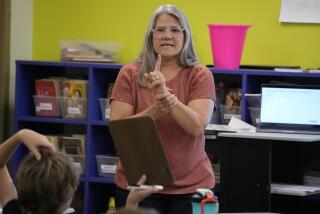PLATFORM : The Art of Teaching Math
- Share via
I will not go so far as to say that philosophy and methodology are irrelevant to the teaching of mathematics--able people debate traditional versus modern approaches--but they are of minor importance in comparison to the single most significant factor in the educational process: the ability of the teacher. This should be the focus of attempts to improve the quality of education.
As a student, I was fortunate to have some truly outstanding teachers in almost every subject I studied. What made each teacher outstanding was his or her ability to communicate a passion for the subject; to make the student feel that a knowledge of the subject was a valuable and important component of life.
I have taught mathematics to prospective teachers for several decades, and many of my students have gone on to teach at elementary schools, middle schools, high schools and colleges. Elementary school teachers usually choose this profession because they like children and want to help them become happy and productive adults. Those who teach mathematics at middle school or higher do so because they enjoy mathematics and feel that by teaching it, they will enrich the lives of their students. A good teacher leaves the student with understanding and ideas as well as a desire to learn more. Philosophy and methodology are tools to be used by a teacher, much as paints and brushes are tools to be used by an artist.
Art flourishes in an environment of freedom. When artists are told what subjects to depict and what styles are acceptable, the art produced becomes stilted and joyless. The same is true of education. When the hands of a teacher are tied by a set of dictates, no matter how well intentioned, the educational process suffers.






